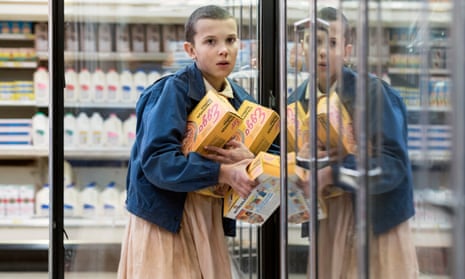The remarkable change in the way the world watches TV has been underlined by new data from Netflix showing that more than 100 million people worldwide now subscribe to the streaming service.
The company - which is now valued at $78bn (£60bn), making it worth almost nine times as much as the UK’s ITV and1.5 times bigger then Rupert Murdoch’s 21st Century Fox - added 5.2 milllion subscribers in the second quarter.
It was a far bigger number than Wall Street had expected and this is traditionally Netflix’s slowest time of the year: over the past five years it has averaged growth of less than 2 million in the spring months.
Most of the growth – more than 4 million of the new users – came from international subscribers lured by Netflix’s combination of new shows such as The Crown and Stranger Things, while stalwarts House of Cards and Orange is the New Black are continuing tofind new audiences.
In the past two decades the company has transformed from a California-based mail order DVD outfit to a global digital giant that has transformed the way the public watch TV.
The company’s share price climbed almost 10% to $180 a share in after-hours trading in New York on Monday, after the new subscriber numbers were revealed. By lunchtime on Wall Street on Tuesday they were up to $183.
For founder Reed Hastings, the continued success of the business the soaring number of subscribers is continued proof that his vision of pick-and-mix TV on demand will replace traditional scheduled TV.
“Creating a TV network is now as easy as creating an app, and investment is pouring into content production around the world,” he said in a letter to shareholders on Monday. “We are all co-pioneers of internet TV and, together, we are replacing linear TV.”
Netflix’s binge-watching model, which was at first seen as commercial suicide by most traditional broadcasters, is now aped by rivals. Such has been its cultural impact that it even spawned an expression to refer to relaxing and catching a show – “Netflix and chill” – although it has since morphed into aeuphemism for sex.
Growth is now being fuelled by growth outside its home market. The boom in international growth followed the expansion of the service into 130 countries last year. More than 52 million of its 104 million subscribers now come from outside the US and only a handful of countries – including North Korea, China and Syria – do not have the service.
Netflix doesn’t provide detailed statistics by country, but Ampere Analysis reckons there are 6.4 million UKsubscribers compared with about 5 million for Amazon Prime Video.
Hastings described the growth as a “good quarter” and said it was the result of “our amazing content”.
The firms popularity has pushed it into an elite club of go-go internet stocks, which have been recording breakneck growth, known as the “Fangs”.
The “big four” tech and media giants - Facebook, Amazon, Netflix and Google – are valued on Wall Street at more than $1.5tn. Netflix has seen its share price rocket 64% over the past year – it is worth almost four times as much as Sky – but it still only ranks as the minnow of the group.
Hastings said the company intends to invest even more in content, even though it is already pouring $6.6bn into making and acquiring TV shows and films this year. Currently nearly $16bn is due to be poured into production over the next five years.
So far this huge investment has fuelled a Netflix hit machine. It has doubled its haul of Emmy nominations this year, securing 91 compared with 54 last year, for 27 titles including The Crown, Stranger Things and Master of None.
Only HBO, on which Netflix has based its model, fared better, with 111 nominations. HBO spends about $2bn annually on content, and Amazon about $4.5bn, according to unofficial analyst estimates.
Netflix famously refuses to reveal figures on how popular, or not, its shows are. Ampere Analysis has produced a report looking at the most cost-effective shows on Netflix by looking at programme budgets cross-referenced with popularity ratings on IMDB, to give a proxy for probable viewing.
According to that data the most cost-effective shows for Netflix – or the best value in terms of spend versus viewing – were 1980s sci-fi drama Stranger Things, teen suicide drama 13 Reasons Why, Narcos, and Marvel series such as Jessica Jones, Daredevil and Luke Cage. House of Cards and Orange is the New Black also ranked highly.
However, the hit machine also has misses. Recently, Netflix has culled a slew of underperforming shows to better balance viewer interest with climbing programme costs.
Ampere says the least cost-effective shows are led by the $9m-per-episode Marco Polo, which was cancelled after two seasons and reportedly resulted in a $200m loss. Another was Baz Luhrmann’s The Get Down, which had a budget of up to $16m an episode, which was cancelled after one season. Other misses have included high-concept sci-fi series Sense8, Hemlock Grove and Girlboss.
Hastings conceded there is furious competition between Netflix and other subscription on-demand TV services, from digital rivals such as Amazon and Hulu to traditional broadcasters such as Sky and the BBC. But he insisted his company was not killing their businesses.
“It seems our growth just expands the market,” he said. “The largely exclusive nature of each service’s content means that we are not direct substitutes for each other, but rather complements.”
Market capitalisation of major media brands
Apple $786bn
Amazon $483bn
Disney $163bn
Netflix $78bn
21st Century Fox $50.8bn
Sky $21bn
Snap (Snapchat owner) $17.7bn
Twitter $14.8bn
ITV $9bn

Comments (…)
Sign in or create your Guardian account to join the discussion